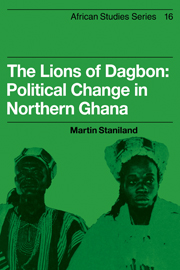Book contents
- Frontmatter
- Contents
- List of maps, figures, and tables
- Preface
- Abbreviations and glossary
- Map 1 Northern Ghana, 1965
- 1 The country and the people
- 2 Dagbon
- 3 Colonial rule, 1899–1930
- 4 Dagomba divided and united, 1899–1930
- 5 The battle of Watherston Road
- 6 Dagomba politics under indirect rule, 1932–1947
- 7 Votibu
- 8 Party politics
- 9 The Yendi tragedy
- 10 Conclusions
- Appendixes
- Notes
- Bibliography
- Index
4 - Dagomba divided and united, 1899–1930
Published online by Cambridge University Press: 04 August 2010
- Frontmatter
- Contents
- List of maps, figures, and tables
- Preface
- Abbreviations and glossary
- Map 1 Northern Ghana, 1965
- 1 The country and the people
- 2 Dagbon
- 3 Colonial rule, 1899–1930
- 4 Dagomba divided and united, 1899–1930
- 5 The battle of Watherston Road
- 6 Dagomba politics under indirect rule, 1932–1947
- 7 Votibu
- 8 Party politics
- 9 The Yendi tragedy
- 10 Conclusions
- Appendixes
- Notes
- Bibliography
- Index
Summary
The King of Yendi refused to sign a treaty in 1894, since he feared the eventual partition of his territory: ‘Did you ever see two men riding one donkey?’ he asked.
The advent of colonial rule was doubly traumatic for the Dagomba ruling class. For not only was the kingdom deprived of sovereignty and the rights and powers attaching to sovereignty, but it was also physically divided between two colonial overlords, the British and the Germans. This chapter is concerned, first, with the exercise of colonial authority in relation to the chiefs; secondly, with the effects of partition upon chieftaincy; and, thirdly, with the politics of reunification following the British invasion of Togo in 1914.
Colonial rule was legitimated, internationally, by the 1899 convention and earlier agreements with France and Gerrhany. Locally, it rested on treaties of protection signed with the Ya-Na and other chiefs in the 1890s. The British refused any recognition to the paramount, forbade chiefs in their domain to have any relations with him, and vested authority instead in the persons of the Karaga-Na and the Yo-Na, both of whom found themselves in British Dagomba. In 1901 the British Commissioner, Major Morris, simply ‘informed an assembly of twenty-two Western Dagomba chiefs that, since the Ya-Na was now in German territory, he and not the Ya-Na was henceforth their Head Chief’.
Between 1899 and 1928 native administration involved reliance on the chiefs. But such reliance, while officially recommended, was pragmatic rather than doctrinaire in spirit. It derived from a recognition of necessity, not from any positively elaborated philosophy of political development.
- Type
- Chapter
- Information
- The Lions of DagbonPolitical Change in Northern Ghana, pp. 57 - 77Publisher: Cambridge University PressPrint publication year: 1975



